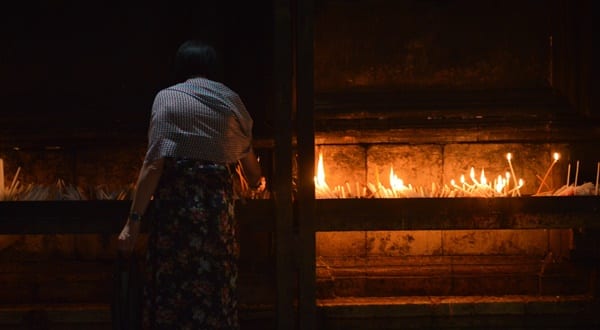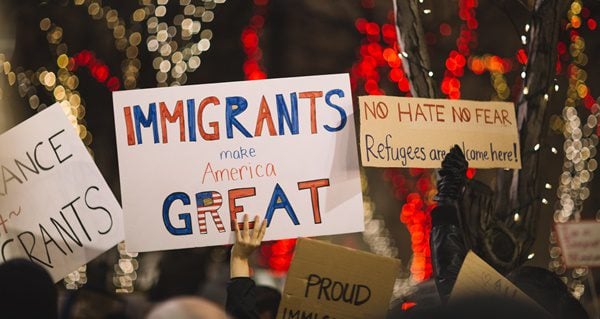
Let’s stop a war.
I mean it. You. Me. Our families, friends, communities. Let us come together now and say no more violence. We must have peace.
The photograph of Aylan Kurdi’s body pierces our hearts. The anguished expressions of families piled into boats as the land behind them is devoured by violence haunt our consciences. We turn to our leaders demanding immediate help for those in need, as only the government can help the refugees arrive safely and legally, allowing us to do our part to welcome and care for them. But there is more to do, and we the peacemakers must take the lead. Before we return to our daily routines, while images of war all-too-often forgotten still burn within our souls, let us sow seeds of peace vocally, actively, and resolutely.
As millions struggle to survive losing possessions, homes and loved ones, seeking sanctuary and shelter in foreign lands, President Obama has asked Congress to authorize a resolution that can only produce more destruction, desperation and death. In an article for Counterpunch, Shamus Cooke reports:
Few U.S. media outlets are reporting about the critical war resolution that the Obama Administration is trying to push through Congress…. The resolution would allow “a 90 day window” for U.S. military attacks in Syria, where both ISIS and the Syrian government would be targeted; with regime change in Syria being the ultimate objective.
As refugees of other US-imposed regime changes struggle to rebuild livelihoods and dignity, we can hardly be surprised when some turn to violence themselves and multiply the violence that our imperialism has generated. We build up or tear down regimes for economic profit with feigned concern for humanitarian interests, as a recent article by Glenn Greenwald, quoting a Washington Post article, explains:
“The countries that cooperate with us get at least a free pass,” acknowledged a senior U.S. official who specializes in Africa but spoke on condition of anonymity to avoid retribution. “Whereas other countries that don’t cooperate, we ream them as best we can.”
The millions of lives destroyed in the process of making a nation more amenable to the interests of the very rich imperial puppeteers is not a chief concern of policy makers. And so even when cases made for war center around human rights violations, we inevitably make nations less stable, hurt more people, and leave not just a power vacuum, but displacement, dismemberment and death, weeping and rage, and a model of imposing one’s will through violence, in our wake. So while our government perpetually creates new enemies, it also creates new public reasons for war and thus new avenues for profiting from control of resources and sale of weapons.
And we are told that the only way to help those suffering and keep ourselves secure is through more war.
For those of us who believe in peacemaking, it can seem hopeless. But we have more power than we realize.
As election season drags on month after month, we are given the impression that the most important issue facing the nation and the world today is whomever will take the reigns of the US executive branch. A good portion of our energy rightly goes toward informing ourselves so we can best exercise our vote. But the fact is, while a new leader will not take office for another 16 months, the world, and especially those suffering, cannot wait for us to sound the cry for peace right now, no matter who holds office.
When even the most progressive of candidates support at least some of the wars and the voices of the hawks drown out the doves, there is a temptation for aspiring peacemakers to resign ourselves to the inevitability of perpetual war. Yet we have the power and the duty to show our will for peace to our current and potential representatives and set the tone for peace for the policy makers to follow.
Warmongering rhetoric and policies of distrust and hostility, both foreign and domestic, have fomented a climate of fear that spreads like a contagion. Absorbing the us-versus-them mentality nurtured by policy makers and echoed by media, we mimetically and unconsciously reinforce this climate of fear. And just as a culture of fear manifests itself in millions of insidious ways, like nurturing a suspicion of even children of a particular race or religion, a culture of empathy must be cultivated by moment to moment decisions to see the human face of the person standing before us. If fear spreads like a contagion, compassion is a cure released into the network of our humanity, also spreading mimetically. We must choose to see the good in someone before critiquing the bad and constantly be wary of the log in our own eyes. Small acts of courage and kindness and humility performed over and over can break down the barriers of fear that have been constructed around our minds and hearts. The day-to-day work of grace will gradually repair the damage done by the daily assault of fear.
But this gradual work, though necessary, is not enough when people are dying right now. When the status quo is perpetual war, when leaders strive to channel even compassion into acts of aggression through the mythology of “humanitarian intervention,” peacemakers must speak up. Peace in our time requires large-scale mobilization as well as day-to-day, moment-to-moment choices for kindness. When the macro and the micro work in tandem, both will gather mimetic momentum.
So what can we do today, on this International Day of Peace, and tomorrow and tomorrow and tomorrow, to end war — in Syria, Afghanistan, Yemen, Iraq, and all over the world?
First we must stop the war of propaganda against hearts and minds by exposing the lie of “humanitarian” violence. Even if motives were honorable, even if there were not conclusive evidence that the United States’ government exploits humanitarian concerns for profit and control, we must counter the myth that there can be such a thing as “noble” violence. Beyond exposing documented evidence that “humanitarian” wars have a track record of leaving nations worse off than they were before and unmasking the true interests behind such interventions, we must counter “conventional wisdom” with common sense. Nations can never be “stabilized” with guns and bombs. Attacks lead to counter-attacks, and if the goal is protection of the people, how many lives must be sacrificed for such “protection?” There is no such thing as a “moderate” fighting force. Good people can believe in violence and take up arms, but the act of killing is always extreme. And there is no one more dangerous than someone who believes wholeheartedly in the righteousness of his (or her) violence.
We must dispel the belief that war is a last resort, because far too often efforts for peace are possible but ignored. The case for peace would be much stronger if the façade of humanitarian motives for war were dropped, so one way to advocate for peace is to unveil the true motives for war in order to dissolve their public support.
And we must channel compassion away from war and toward peace. The truth is, there is so much we can do if we think outside the suffocating box of violence. For immediate help in Syria, we must stop making, supplying and funding weapons. Rick Sterling, cofounder of the Syria Solidarity Movement, says,
A solution to the Syrian refugee crisis is possible. It would involve outside powers giving up their demand for ‘regime change’ and stopping their support, training and funding of violent opposition groups. There could be an internationally enforced agreement with guarantees for the right to peacefully protest and elections. What is needed is to stop the violence and allow for the start of reconciliation and rebuilding without preconditions.
If we can channel our sorrow and empathy for those fleeing their countries into demands for peaceful negotiations, we can potentially influence leaders toward policies that could save rather than destroy lives.
Beyond demands for immediate peaceful negotiations, much must be done to repair environments ravaged by war. Much must be done to restore the health, livelihoods, confidence, and futures of the people whose lives have been uprooted. It starts with an acknowledgement of our damage and a sincere apology. And from there we go on to the work of making reparations. We should channel our good intentions into good actions by repairing homes, schools, and businesses, providing healthcare, and working on ways to repair land damaged by bombs and poisoned by blood. We should steer our ingenuity away from developing weapons toward working on desalination technology to provide fresh water to a dangerously dehydrated region. And we should offer these services without charge to the people whose lives our government has stolen. To go into a war-damaged land unarmed with a completely peaceful mission is a risk, but the risk is much less than our leaders, seduced by the power of violence, would have us believe. As peacemaker Kathy Kelly has pointed out in numerous articles writing from war-torn countries, when you give people the services they need, chances are they will not harm you. Quoting Luca Radaelli, the medical coordinator of the Kabul hospital in an Italy-based network of free hospitals called “Emergency,” Kelly writes:
If you provide something good, something skilled, and it is free of charge… there is no need to protect yourself. People won’t get angry. … What’s so complicated?
Such reparations are not only uncomplicated, they are essential for the healing of our souls as well as the healing of those whom we have harmed. And they are essential to our national and global security, because the converse is also true: If you take away a country’s livelihood and leave the people without family, friends, and futures, those people will often turn to violence. We have the means to reverse this horribly predictable cycle. Every current policy maker and political hopeful should hear the message loud and clear: No discussion of national security is complete without discussing concrete ways of turning people we have made our enemies into our friends by being a friend.
Peace cannot wait. The worst refugee crisis since the end of World War II will only get worse if wars continue to be waged for any reason. We have no excuse to wage war when the humanitarian cover for our government’s actions is ripped away and it becomes clear that destroyed human lives are used as stepping stones to power and control of resources. And even if we could shut our hearts to the people immediately harmed by imperial greed, we cannot escape the fact that the extraction of resources, and the destruction of land and people that comes with attaining them, is destroying our ecosystem. At a time when our planet is in peril from climate change, we cannot afford to wage wars anywhere. We are living on a sinking ship and we’re all in the same boat.
I have no illusions that the struggle for peace will be easy. But the words of Dr. King have never been more true: “It is no longer a choice between violence and nonviolence in this world; it’s nonviolence or nonexistence. That is where we are today.” And I believe in the power of compassion to stem and reverse the tide of violence. Violence is a powerful contagion, feeding off of our insecurities and mimetically infecting the whole human race. But love is more powerful still. Love pulls us together, drawing on our innermost desires implanted in us by the One in whose image we are made. That desire is that none of us should perish, that we all may have life and have it more abundantly. That can only happen if we put our weapons down. Now.
So on this International Day of Peace, let’s stop a war. Let’s stop all war forever.











